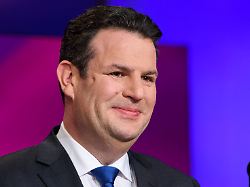“State wage instead of tariff policy”
Heil’s minimum wage push enrages employers
04/10/2023, 5:11 p.m
Although the state does not set salaries in Germany, Minister of Labor Heil has announced a significant increase in the minimum wage for 2024. The responsible collective bargaining commission and the FDP rate the advance of the SPD politician as encroachment.
Federal Minister of Labor Hubertus Heil has promised a significant increase in the minimum wage for the coming year – and with his advance has drawn sharp criticism from employers, but also from the coalition partner FDP. The SPD politician told the “Bild am Sonntag”: “Work must be worthwhile. That is why there will be another minimum wage increase next January.” He expects a “significant increase”. The minister referred to the high inflation and tariff increases, which are reflected in the minimum wage.
A committee made up of employer and employee representatives is responsible for setting the minimum wage. This permanent independent minimum wage commission submits an adjustment proposal to the government every two years, with the next one expected in the summer. Most recently, the minimum wage was increased from 10.45 euros to 12 euros per hour on October 1st. The government had decided on this one-time step and not the commission set up specifically for this purpose.
The Confederation of German Employers’ Associations (BDA) explained that so far “there was always talk of a one-off intervention”. Heil “sabotages the work of the independent minimum wage commission,” criticized BDA chief executive Steffen Kampeter. “State wage setting instead of collective bargaining seems to be the stipulation from the Ministry of Labour,” says Kampeter. “The coalition leadership must decide whether it will continue to tolerate the Federal Minister of Labor’s continued transgressions,” he added, referring to Chancellor Olaf Scholz.
The chairman of the FDP parliamentary group in the Committee on Labor and Social Affairs, Jens Beeck, emphasized: “In Germany, wages are determined by the collective bargaining partners.” This also applies to the minimum wage. Due to the development of collective wages, Heil’s expectation of a minimum wage increase is “not implausible”, said Beeck. “However, it is neither the minister’s job to speculate publicly nor to want to exert influence.” The political increase in the previous year was “unique”, explained Beeck. “A renewed political determination of the minimum wage, bypassing the recommendations of the minimum wage commission, is out of the question.” FDP Vice President Wolfgang Kubicki also criticized Heil. “Apart from the fact that you can definitely make this prognostic assessment, it is unfortunate when a federal minister intervenes publicly on this issue,” he told the Funke newspapers.
“Political wage determination is wrong”
Criticism also came from the Parliamentary Secretary of the Union faction in the Bundestag, Thorsten Frei. “For the minimum wage, the independent minimum wage commission makes a proposal for 2024,” Frei told the Funke newspapers. “It is irritating that the Secretary of Labor is now commenting on this.” The CDU politician added: “In any case, political wage determination is wrong.”
Left leader Janine Wissler, on the other hand, called for rapid legal action. “In view of skyrocketing prices, the minister must not wait for the minimum wage commission,” she told the Funke newspapers. As in the previous year, Heil should set the new minimum wage by law, “and as quickly as possible”. Wissler emphasized: “Employees need at least 13 euros – because below this minimum wage does not protect against poverty in old age.” At the same time, she called for stricter controls as to whether the prescribed minimum wage was actually paid.
Heil also announced that he would present a draft of the law on collective bargaining agreed in the coalition agreement by June. “The federal contractors must grant their employees all the regulations of the industry collective agreement – from wage levels to bonuses and vacation to Christmas bonuses,” he said. The aim is for the law to come into force in early 2024.
